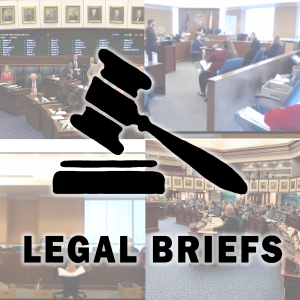Is the Notice of Intent to Litigate retroactive?
 A dispute over a 2021 law that placed additional hurdles to filing lawsuits against property insurance companies might reach the Florida Supreme Court, an appeals court rules explosive damage is covered by property insurance, and a dispute between bankers and lawyers over interest paid on the lawyers’ trust accounts is heading to court. It’s all in this week’s Legal Briefs.
A dispute over a 2021 law that placed additional hurdles to filing lawsuits against property insurance companies might reach the Florida Supreme Court, an appeals court rules explosive damage is covered by property insurance, and a dispute between bankers and lawyers over interest paid on the lawyers’ trust accounts is heading to court. It’s all in this week’s Legal Briefs.
Notice of Intent to Litigate Retroactivity: Last week the Sixth District Court of Appeal sided with a Collier County homeowner about the retroactivity question of SB 76, a 2021 insurance law that requires a 10-day notice before lawsuits are filed against insurance companies. The homeowner incurred water damage on her house in 2019, but waited to file the lawsuit until August 2021, which was one month after the new law went into effect. The legislation was designed to stem the high volume of lawsuits that’s led to rising property insurance prices and an unstable market. The homeowner’s lawsuit was filed without the notice and her insurance company, Universal Property Insurance, was successful in having a Collier County Circuit Judge dismiss it. But the 6th DCA overturned the decision – and found that the text “contains no clear evidence of legislative intent for retroactive application”. It acknowledged its decision is in direct conflict with a May decision by the 4th DCA in Broward County and has asked the Florida Supreme Court to review these cases.
An Explosive Appeals Case: In 2016, a rock quarry operation using explosive blasts caused such a stir that it actually damaged parts of a nearby home, leaving cracks from the seismic activity – and ever since, Mario Bermudez has been fighting for coverage under his property insurance policy. Just last week, the Third District Court of Appeal upheld the ruling requiring Tower Hill Prime Insurance Co. to cover the damages to the Bermudez home, amounting to $62,000. The proceedings ended in a so-called ‘battle of the experts’ as Bermudez’ counsel argued the seismic activity was indeed caused by the mining at the rock quarry – and Tower Hill insisted it was not responsible for damages caused by ‘Earth movement’ as outlined in the policy. A jury in the trial court case had sided with the homeowner, citing shockwave damage from blasting had caused cracks in ceiling and floors of the home, as well as the driveway and pool walls – not just natural soil movement. Tower Hill’s subsequent request for a directed verdict in favor of the company was denied.
Giving an IOTA: This past March, the Florida Supreme Court approved a Florida Bar request to update the landmark Interest on Trust Accounts (IOTA) program, which invests interest from lawyers’ trust accounts to fund legal aid programs for low-income Floridians. The new IOTA rule requires lawyers to keep client money in higher-yield trust accounts. Doing so has already netted trust accounts’ earnings up to $60 million so far in 2023, up from $16.2 million in all of last year. However, the Florida Bankers Association (FBA) isn’t happy with the turn of events and has asked the Florida Supreme Court to take a second look. The FBA wrote in its request that the new rule “raises grave concerns, including the practical and perhaps unintended consequences the Rule will have on FBA members, law firms, and an already stressed banking industry.” Ten more banks have signed-on to participate in the voluntary program since its March revamp. A ruling by the Supreme Court could come at any time.
LMA Newsletter of 12-4-23

